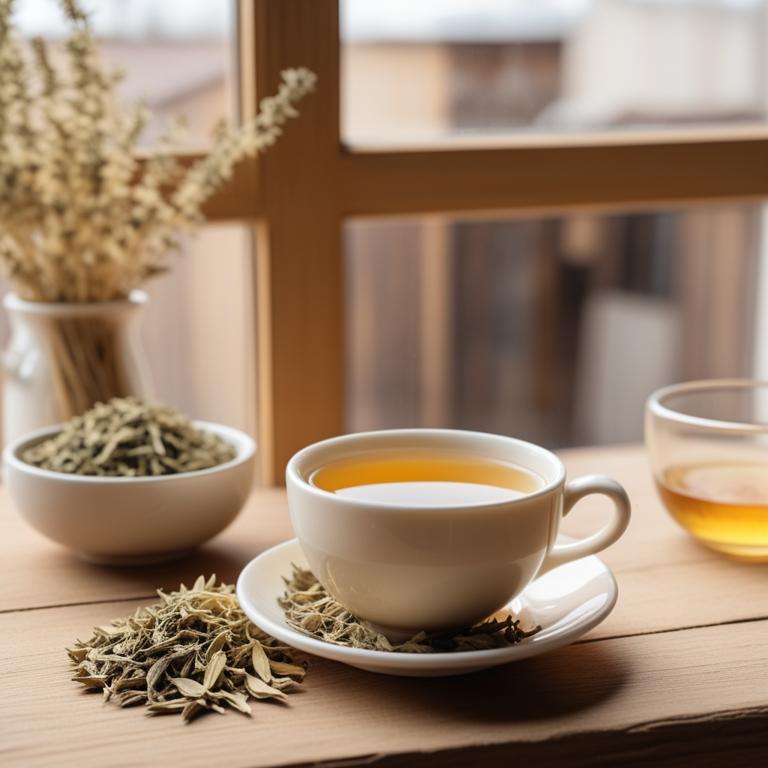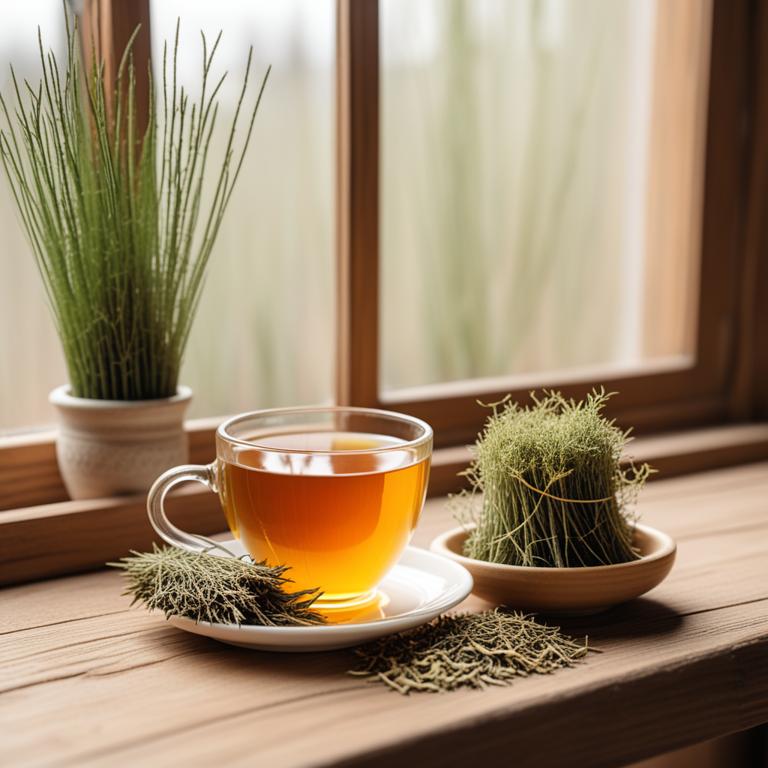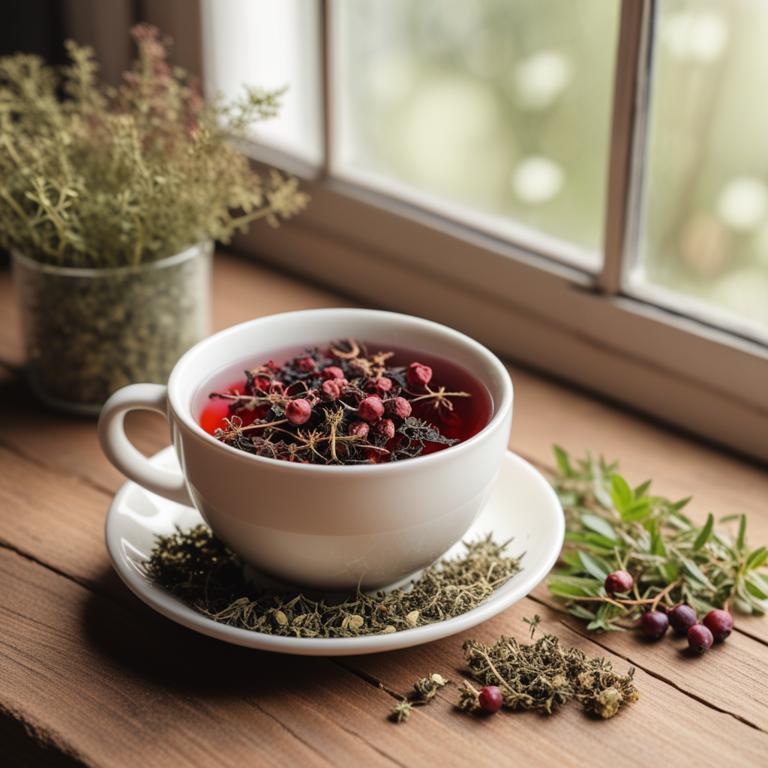11 Herbal Teas For Hematuria

If you're experiencing hematuria, which is the presence of blood in your urine, you might be interested in trying some herbal teas for relief.
Hematuria can be caused by various factors such as infections, kidney stones, or even certain medications. Some herbal teas have been traditionally used to help alleviate the symptoms and even address the underlying issues. For instance, Glycyrrhiza glabra, also known as licorice root, has anti-inflammatory properties that can help reduce swelling and discomfort in the urinary tract. It also has antimicrobial properties, which can combat bacterial infections that might be causing the hematuria. Silybum marianum, or milk thistle, is another herb that's been used to treat liver and kidney problems, which can sometimes lead to hematuria. It's believed to help protect the liver and kidneys from damage, and also has antioxidant properties that can help reduce oxidative stress.
Taraxacum officinale, or dandelion root, is also worth mentioning, as it's been traditionally used to treat kidney stones and other urinary issues. It's thought to help stimulate digestion and reduce inflammation in the urinary tract. Drinking herbal teas like these can provide several benefits beyond just relieving hematuria symptoms. They can also help to reduce discomfort, promote relaxation, and even support overall health. Some people find that these teas help to boost their mood and energy levels, which can be especially helpful if you're experiencing pain or discomfort due to hematuria. Of course, it's always a good idea to talk to your doctor before trying any new herbal remedies, especially if you're already taking medications or have underlying health conditions.
However, for some people, herbal teas like these can be a natural and effective way to manage hematuria symptoms and promote overall well-being.
- 1. Glycyrrhiza glabra
- 2. Silybum marianum
- 3. Taraxacum officinale
- 4. Urtica dioica
- 5. Equisetum arvense
- 6. Echinacea purpurea
- 7. Hypericum perforatum
- 8. Achillea millefolium
- 9. Vaccinium macrocarpon
- 10. Ginkgo biloba
- 11. Astragalus membranaceus
1. Glycyrrhiza glabra

Glycyrrhiza glabra teas contains glycyrrhizin, a triterpenoid saponin that has anti-inflammatory properties.
These properties can help to reduce swelling and inflammation in the urinary tract, which can cause hematuria, or blood in the urine. Glycyrrhizin also has antioxidant properties, which can help to protect the kidneys and bladder from damage. Another key constituent in Glycyrrhiza glabra teas is licoricidin, a flavonoid that has been shown to have anti-inflammatory and antimicrobial properties, helping to prevent infection and promote healing.
By reducing inflammation, protecting the kidneys, and preventing infection, Glycyrrhiza glabra teas may help to alleviate symptoms of hematuria.
- Gather 1 cup of fresh or dried Glycyrrhiza glabra roots. Clean and chop the roots into small pieces.
- Measure 2 tablespoons of the chopped roots. Place them in a pot with 4 cups of water.
- Heat the mixture over medium heat for 10-15 minutes. Let it simmer until the liquid reduces slightly.
- Strain the mixture into a large cup or teapot. Discard the solids and let the tea cool.
- Drink 1 cup of the tea 2-3 times a day. You can add honey to taste, if needed.
2. Silybum marianum

Silybum marianum teas contains a group of active compounds called flavonoids, which are known to have anti-inflammatory properties.
These compounds, specifically silibinin, silidianin, and silicristin, help to reduce swelling and inflammation in the urinary tract, making it easier to diagnose and manage hematuria. The flavonoids in Silybum marianum teas also have antioxidant properties, which help to protect the kidneys from damage caused by free radicals. Additionally, Silybum marianum teas contain silymarin, a flavonoid complex that helps to improve liver function and reduce oxidative stress, both of which can contribute to hematuria.
By reducing inflammation and improving liver function, Silybum marianum teas may help to alleviate symptoms of hematuria, making it a potential natural remedy for this condition.
- Gather 1 cup of dried Silybum marianum flowers and leaves.
- Boil 1 cup of water in a pot.
- Add 1 tablespoon of dried Silybum marianum flowers and leaves to the boiling water.
- Reduce heat and let it simmer for 5-7 minutes.
- Strain the tea and drink 1 cup, 2-3 times a day.
3. Taraxacum officinale

Taraxacum officinale teas contains bioactive constituents like flavonoids, phenolic acids, and terpenoids.
These compounds have anti-inflammatory and antioxidant properties, which can help reduce inflammation in the urinary tract and protect it from oxidative damage. The flavonoids in Taraxacum officinale tea, specifically quercetin and kaempferol, can help reduce bleeding by strengthening blood vessel walls and improving blood clotting. The terpenoids, such as sesquiterpenes, have anti-inflammatory and antimicrobial properties that can help combat bacterial infections in the urinary tract and reduce symptoms of hematuria.
The antioxidant properties of Taraxacum officinale tea can also help repair damaged tissues in the urinary tract and promote healing.
- Gather 1 cup of fresh Taraxacum officinale leaves and flowers.
- Dry the leaves and flowers in a cool, dry place for 1-2 weeks.
- Steep 1 tablespoon of dried Taraxacum officinale in 1 cup of boiling water for 5-7 minutes.
- Strain the tea and add honey to taste. Drink 2-3 cups a day.
- Consult a doctor before using Taraxacum officinale tea for hematuria, especially if you have any underlying medical conditions.
4. Urtica dioica

Urtica dioica teas contains bioactive constituents like flavonoids, phenolic acids, and saponins that help with hematuria.
Flavonoids in Urtica dioica teas have anti-inflammatory properties, which reduce inflammation in the urinary tract and alleviate symptoms of hematuria. Phenolic acids in the tea have antioxidant properties, protecting the urinary tract from damage and promoting healing. Saponins in Urtica dioica teas have antimicrobial properties, preventing infections that can cause hematuria.
By reducing inflammation, promoting healing, and preventing infections, Urtica dioica teas can help alleviate symptoms of hematuria.
- Gather 2 cups of fresh Urtica dioica leaves and flowers, or 1 cup of dried Urtica dioica.
- Combine the Urtica dioica with 1 cup of boiling water in a large cup or teapot.
- Steep the mixture for 5-10 minutes to allow the flavors and benefits to release.
- Strain the tea and discard the solids. Add honey or lemon to taste, if desired.
- Drink the Urtica dioica tea 2-3 times a day for relief from hematuria symptoms.
5. Equisetum arvense

Equisetum arvense teas contains flavonoids, such as taxifolin and isorhapontigenin, and phenolic acids like ferulic acid and sinapic acid.
These bioactive constituents have anti-inflammatory properties, which can help reduce swelling and inflammation in the urinary tract, a common cause of hematuria. The flavonoids in Equisetum arvense teas also have antioxidant properties, which can help protect the kidneys and bladder from damage caused by free radicals. Additionally, the saponins present in the tea may help to reduce bacterial adhesion and biofilm formation in the urinary tract, further contributing to its potential benefits for hematuria.
By reducing inflammation and protecting the urinary tract, Equisetum arvense teas may help alleviate symptoms of hematuria and promote healing.
- Gather 1 cup of fresh or dried Equisetum arvense (horsetail) leaves and stems.
- Combine 1 tablespoon of Equisetum arvense with 1 cup of boiling water in a heat-resistant cup.
- Let the mixture steep for 5-7 minutes. Then, strain the liquid using a fine-mesh sieve or cheesecloth.
- Discard the solids and pour the tea into a clean cup. You can add honey or lemon to taste, if needed.
- Drink the Equisetum arvense tea 2-3 times a day, as needed, to help manage hematuria symptoms.
6. Echinacea purpurea

Echinacea purpurea teas contains bioactive constituents like alkylamides, flavonoids, and phenolic acids that help with hematuria.
Alkylamides have anti-inflammatory properties that reduce swelling in the urinary tract, making it easier to pass urine. Flavonoids, particularly kaempferol and quercetin, have antioxidant effects that protect the kidneys from damage and promote healing. Phenolic acids, such as ferulic acid, have antimicrobial properties that prevent infections in the urinary tract, which can cause hematuria.
By reducing inflammation, promoting healing, and preventing infections, Echinacea purpurea teas helps alleviate symptoms of hematuria.
- Gather 1 cup of fresh or dried Echinacea purpurea flowers.
- Measure 1 tablespoon of Echinacea purpurea flowers and place them in a tea infuser.
- Boil 1 cup of water in a pot and reduce the heat to medium.
- Place the tea infuser with the Echinacea purpurea flowers in the pot and let it steep for 5-7 minutes.
- Strain the tea and discard the flowers. Drink the tea warm, 2-3 times a day, for hematuria relief.
7. Hypericum perforatum

Hypericum perforatum teas contains flavonoids, naphthoquinones, and phenolic acids, which make it beneficial for treating hematuria.
Flavonoids like rutin and quercetin have anti-inflammatory properties, reducing blood vessel inflammation that can cause bleeding in the urinary tract. Naphthoquinones, especially hyperforin, have antioxidant effects that protect the cells from damage and promote healing. Phenolic acids like caffeic acid have antimicrobial properties, preventing infections that can cause hematuria.
By reducing inflammation and promoting healing, the bioactive constituents in Hypericum perforatum teas can help alleviate hematuria symptoms.
- Gather 1 cup of fresh Hypericum perforatum flowers or 2 tablespoons of dried flowers.
- Measure 1 cup of boiling water and pour it over the flowers in a heat-resistant cup.
- Let the mixture steep for 5-7 minutes, then strain the liquid using a fine-mesh sieve into another cup.
- Add honey to taste, if desired, and mix well. The recommended dosage is 1-2 cups of tea per day.
- Drink the tea slowly and wait for the recommended 30 minutes to 1 hour to see the effects on hematuria.
8. Achillea millefolium

Achillea millefolium teas contains sesquiterpenes, flavonoids, and essential oils, including chamazulene and luteolin.
These compounds give the tea anti-inflammatory properties, which help to reduce swelling and irritation in the urinary tract. The flavonoids in the tea also have antioxidant properties, which can help to protect the kidneys and reduce oxidative stress. The anti-inflammatory properties of the tea can help to reduce bleeding and inflammation in the urinary tract, making it a potential remedy for hematuria.
By reducing inflammation and oxidative stress, Achillea millefolium teas may provide relief from the symptoms of hematuria.
- Gather 2 tablespoons of dried Achillea millefolium leaves and flowers.
- Combine the dried leaves and flowers with 1 cup of boiling water in a heat-resistant cup.
- Steep the mixture for 5-7 minutes, then strain it using a fine-mesh sieve or cheesecloth.
- Discard the solids and let the tea cool to room temperature.
- Drink 1 cup of the cooled tea 2-3 times a day to help manage hematuria symptoms.
9. Vaccinium macrocarpon

Vaccinium macrocarpon teas contains anthocyanins and phenolic acids, which have antioxidant properties that help reduce inflammation and oxidative stress in the urinary tract.
The anthocyanins in Vaccinium macrocarpon teas can act as anti-inflammatory agents, reducing swelling and pain in the bladder and kidneys. The phenolic acids, particularly chlorogenic acid, have been shown to inhibit the growth of bacteria that can cause urinary tract infections. Vaccinium macrocarpon teas also contains tannins, which have astringent properties that help reduce bleeding and inflammation in the urinary tract.
By reducing inflammation and preventing bacterial growth, Vaccinium macrocarpon teas may help alleviate symptoms of hematuria, such as blood in the urine and pain during urination.
- Gather 1 cup of Vaccinium macrocarpon berries (also known as cranberries).
- Rinse the berries and remove any stems or debris. Use 1 tablespoon of honey (optional) for added sweetness.
- Combine the berries and honey (if using) in a saucepan. Add 2 cups of water.
- Heat the mixture on low heat for 10-15 minutes, or until the berries have broken down and the liquid has reduced slightly.
- Strain the mixture through a cheesecloth or fine-mesh sieve into a cup. Discard the solids and let the tea cool. Drink 1-2 cups of the tea, 3 times a day, as needed for hematuria relief.
10. Ginkgo biloba

Ginkgo biloba teas contains flavonoids and terpenoids as its bioactive constituents.
These compounds have antioxidant and anti-inflammatory properties that help reduce bleeding in the urinary tract. The flavonoids in Ginkgo biloba, specifically quercetin and kaempferol, have been shown to improve blood vessel function and reduce inflammation, which can contribute to hematuria. The terpenoids, including ginkgolides and bilobalide, have anti-inflammatory properties that can help reduce swelling and bleeding in the urinary tract.
Regular consumption of Ginkgo biloba teas may help alleviate symptoms of hematuria by improving blood vessel function and reducing inflammation in the urinary tract.
- Gather 1 cup of fresh or dried Ginkgo biloba leaves.
- Use a blender or coffee grinder to crush 2 tablespoons of the Ginkgo biloba leaves into a fine powder.
- Add 1 cup of boiling water to a teapot or a heat-resistant cup.
- Add 1/2 teaspoon of the Ginkgo biloba powder to the boiling water and stir well.
- Let the mixture steep for 5-7 minutes, then strain and drink 1 cup of the tea, 2-3 times a day.
11. Astragalus membranaceus

Astragalus membranaceus teas contains bioactive constituents like astragaloside IV, astragaloside I, and polysaccharides.
These compounds have anti-inflammatory properties that help reduce swelling in the kidneys and urinary tract, a common cause of hematuria. The flavonoids and saponins in the tea also have antioxidant properties, which can help protect the kidneys from damage and promote healing. Astragalus membranaceus tea has been shown to improve kidney function and reduce the frequency of bleeding episodes in people with hematuria.
By reducing inflammation and promoting healing, Astragalus membranaceus tea may help alleviate symptoms of hematuria and support kidney health.
- Gather 2 teaspoons of dried Astragalus membranaceus root.
- Boil 1 cup of water in a pot.
- Add the 2 teaspoons of dried Astragalus membranaceus root to the boiling water.
- Reduce heat and let it steep for 5-7 minutes.
- Strain the tea and drink 1/2 to 1 cup, 2-3 times a day.